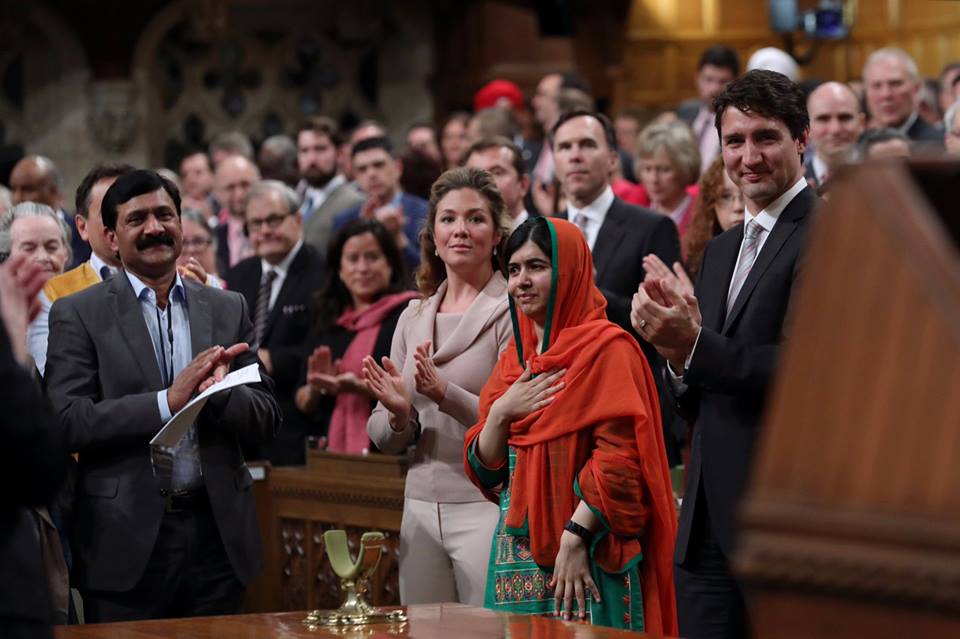
OTTAWA—Interim Conservative leader Rona Ambrose wants Prime Minister Justin Trudeau to answer Pakistani activist Malala Yousafzai’s call to put advancing girls’ education at the heart of Canada’s turn at the helm of the G7.
Ambrose met with the 19-year-old Nobel Peace Prize winner and newly minted honorary Canadian citizen Wednesday after she used a speech to Parliament to charmed and challenged Canadians to do more for girls’ education.
“The world needs leadership based on serving humanity — not based on how many weapons you have. Canada can take that lead,” Yousafzai said.
She urged the government to make the issue the central initiative of next years’ G7 presidency, and also to host the replenishment conference of the Global Partnership for Education, a multilateral organization that has received close to $200 million in Canadian funding since 2007.
“I am asking that your government answer Malala’s call,” Ambrose writes in a letter to Trudeau released Thursday.
Ambrose was the Conservative status of women minister when Canada last hosted the G7, where the government’s maternal, newborn and child health project — an effort that become known as the Muskoka initiative — was the centrepiece.
“Malala asked us to seize every opportunity for girls’ education over the next year,” she writes.
“My party and I stand with Malala, and I hope you agree with me in making girls’ education Canada’s central legacy project for the G7 presidency.”
Trudeau met with Yousafzai after her speech as well, saying he was inspired by her words and looks forward to renewing Canada’s efforts to have a positive impact on the world.
The Liberals are preparing to announce a new international aid policy, with women and girls expected as a major focus.
Canadian international assistance to the education sector in 2015-16 was approximately $377 million, down from $457 million the year before, government reports show.
Yousafzai spoke of the benefits that flow from increased access to education for girls, but next door to her home country of Pakistan, whether international aid dollars for education are achieving those kinds of results remains under investigation.
Global Affairs Canada officials say they are still looking into the possibility that Canadian dollars put into a World Bank program to increase girls access to education in Afghanistan may have disappeared into the pockets of corrupt officials.
Last December, Afghanistan’s education minister told the country’s news media that while the previous government said 11 million kids were in school, it appeared only six million had been enrolled.
The schools and their teachers are funded through a World Bank program called the Education Quality Improvement Project, to which Canada has donated more than $117.6 million since 2006.
“Since these allegations were made, Canada has engaged with partners, including the World Bank, which is assessing the validity of the information and whether fraud has occurred,” Brittany Venhola-Fletcher, a spokesperson for Global Affairs Canada, said in an email.
“Canada is also following up on these allegations directly with the Afghan Ministry of Education. Further actions will be determined following the results of these assessments.”
Earlier this month, John Sopko, the U.S. special inspector general for Afghanistan reconstruction, met with foreign affairs officials as part of a trip to Canada organized by the University of Ottawa.
Sopko continues to investigate the so-called ghost schools issue; a review of schools in Balkh province released in March found while officials reported an enrolment of 2,461 at the 26 schools inspected, only about 30 per cent were observed attending at the time of inspection.
He said he had frank conversations with Canadians about ongoing investigations into schools and other projects, and offered the support of his office.
“We’re the only people there and we talked about that, since we are still getting out and we still have capabilities of doing that, we offered that capability to the Canadian officials that if there is something you want us to look at, we’re happy to help you,” Sopko said in an interview with The Canadian Press.
“But they haven’t taken us up on that offer.”
Venhola-Fletcher said the government of Canada values Sopko’s office’s work but also does their own.
Past reviews of Canadian aid spending in Afghanistan have found mixed results.
A signature project of the last Conservative government had been building, expanding or renovating 50 schools and an evaluation of those efforts found that while 50 schools at least were built, how many kids were in them was impossible to answer.